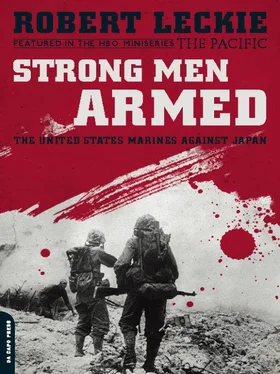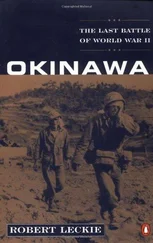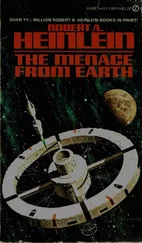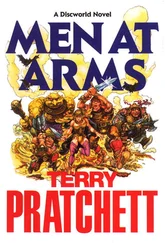Robert Leckie - Strong Men Armed
Здесь есть возможность читать онлайн «Robert Leckie - Strong Men Armed» весь текст электронной книги совершенно бесплатно (целиком полную версию без сокращений). В некоторых случаях можно слушать аудио, скачать через торрент в формате fb2 и присутствует краткое содержание. Город: Cambridge, Год выпуска: 2010, ISBN: 2010, Издательство: Da Capo Press, Жанр: nonf_military, на английском языке. Описание произведения, (предисловие) а так же отзывы посетителей доступны на портале библиотеки ЛибКат.
- Название:Strong Men Armed
- Автор:
- Издательство:Da Capo Press
- Жанр:
- Год:2010
- Город:Cambridge
- ISBN:978-0-786-74832-7
- Рейтинг книги:3 / 5. Голосов: 1
-
Избранное:Добавить в избранное
- Отзывы:
-
Ваша оценка:
- 60
- 1
- 2
- 3
- 4
- 5
Strong Men Armed: краткое содержание, описание и аннотация
Предлагаем к чтению аннотацию, описание, краткое содержание или предисловие (зависит от того, что написал сам автор книги «Strong Men Armed»). Если вы не нашли необходимую информацию о книге — напишите в комментариях, мы постараемся отыскать её.
Strong Men Armed — читать онлайн бесплатно полную книгу (весь текст) целиком
Ниже представлен текст книги, разбитый по страницам. Система сохранения места последней прочитанной страницы, позволяет с удобством читать онлайн бесплатно книгу «Strong Men Armed», без необходимости каждый раз заново искать на чём Вы остановились. Поставьте закладку, и сможете в любой момент перейти на страницу, на которой закончили чтение.
Интервал:
Закладка:
“Will I live?”
The doctor nodded, and Bradley wrote once more:
“Will I speak again?”
The doctor hesitated, then nodded a second time. Bradley grinned. Almost with a flourish, he wrote:
“What the hell’s the use in worrying!”
That was the sardonic spirit that took Tulagi, and it would be this—during the four-month ordeal ahead—that would hang on to Guadalcanal.
4
Guadalcanal.
She was beautiful seen from the sea, this slender long island. Her towering central mountains ran down her spine in a graceful east-west keel. The sun seemed to kiss her timberline, and lay shimmering on open patches of tan grass dappling the green of her forests. Gentle waves washed her beaches white, raising a glitter of sun and water and scoured sand beneath fringing groves of coconut trees leaning langorously seaward with nodding, star-shaped heads.
She was beautiful, but beneath her loveliness, within the necklace of sand and palm, under the coiffure of her sun-kissed treetops with its tiara of jeweled birds, she was a mass of slops and stinks and pestilence; of scum-crested lagoons and vile swamps inhabited by giant crocodiles; a place of spiders as big as your fist and wasps as long as your finger, of lizards as long as your leg or as brief as your thumb; of ants that bite like fire, of tree-leeches that fall, fasten and suck; of scorpions without the guts to kill themselves, of centipedes whose foul scurrying across human skin leaves a track of inflamed flesh, of snakes that slither and land crabs that scuttle —and of rats and bats and carrion birds and of a myriad of stinging insects. By day, black swarms of flies feed on open cuts and make them ulcerous. By night, mosquitoes come in clouds—bringing malaria, dengue or any one of a dozen filthy exotic fevers. Night or day, the rains come; and when it is the monsoon it comes in torrents, conferring a moist mushrooming life on all that tangled green of vine, fern, creeper and bush, dripping on eternally in the rain forest, nourishing kingly hardwoods so abundantly that they soar more than a hundred feet into the air, rotting them so thoroughly at their base that a rare wind—or perhaps only a man leaning against them—will bring them crashing down.
And Guadalcanal stank. She was sour with the odor of her own decay, her breath so hot and humid, so sullen and so still, that all those Marines who came to her shores on the morning of August 7 cursed and swore to feel the vitality oozing from them in a steady stream of enervating sweat.
Vandegrift’s main body, some 10,000 men of the First and Fifth Marines, had hit Red Beach almost at the center of Guadalcanal’s northern coastline. The Fifth landed first, with two battalions abreast. Unopposed, they jabbed inland, then wheeled to their right, or west, to work along the shore toward Japanese installations near the Lunga River. A Japanese laboring force of about 1,700 men had fled when the first of the American shells and bombs crashed among them as they sat at breakfast. Marines bursting into their encampment found bowls of still-warm rice on tables. More important, the Japanese had abandoned an airfield nearly complete with hangars, blast pens and a dirt runway 3,600 feet long. This was named Henderson Field after Major Lofton Henderson, who gave his life crash-diving a Japanese warship at the Battle of Midway. There was not only Henderson Field but also a complex of wharves, bridges, ice plants, radio stations and power and oxygen plants which the Japanese had succeeded in throwing up since work began July 4. There were tons and tons of rice —wormy, despicable rice which the Marines spurned but fortunately did not destroy, for it would one day stand between them and starvation. These were not all discovered the first day, although the airfield was captured by the First Marines on August 7.
This regiment (Marine regiments are always called “Marines” in the way that Army regiments are known by their arm, as in “4th Cavalry” or “19th Infantry”) followed the Fifth ashore. One battalion turned right to overrun the undefended airfield. The other two plunged into the steaming morass beyond or south of it.
All day long the men of these battalions toiled up slime-slick hills and slipped and slid down the reverse slopes, with the machine-gunners breaking the rule of silence by yelps of pain whenever heavy tripods banged cruelly against their necks. They thrashed through fields of sharp-edged kunai grass as tall as a man, sometimes shooting at each other. They forded swift cold jungle streams, often stooping to slosh the blessed water against their faces, even lying full-length in the shallows to let it fall into open mouths—ignoring the officers crying, “Don’t drink! It may be poisoned!” Back came the unfailing reply: “Fer gawd’s sake, lootenant—even the Japs can’t poison a whole damn river!”
If there had been an organized enemy in the Guadalcanal jungle that day, there might have been an American catastrophe. For these Marines were far from professionals as they blundered onward toward their objective: a high clear height called Grassy Knoll, or Mount Austen, which commanded Henderson Field from the south.
But if the jungle dissolved Marine discipline, it did not dampen Marine humor. That night, after the men had dug foxholes in the dank earth, they began to ask each other what it was all about. What did General Vandegrift want with Grassy Knoll?
“Maybe,” said a private, “it’s because it’s the only place with a view.”
“So?”
“Where else they gonna put the officers’ club?”
Then they fell silent, half of them to stand guard in that blind, black whispering jungle, the other half to attempt sleep beneath ponchos that failed to keep out the rain because of the big hole for the head, or behind little veils of mosquito netting that could not keep mosquitoes off because they were plastered to their faces.
They awoke in the morning—puff-eyed, bitten and soaked —and began sloshing south again.
At ten minutes of nine on the morning of August 8, the Australian Jack Read stood on a hill overlooking Buka Passage and counted 45 Japanese bombers flying overhead. They had come from Kavieng. Before the sound of their motors had faded behind him, Read was in his shack and at his radio.
“Forty-five bombers going southeast.”
A half-hour later Pearl Harbor again broadcast a warning to the Solomons fleet, and General Vandegrift decided that the noon arrival of the enemy bombers would be just the time to give his beach working parties a rest.
There were just a few hundred of these working-party men, and they were all headquarters troops and specialists. There were no stevedoring battalions to do the job, and Vandegrift dared not risk detaching any combat troops for it. Though the beach was a jumbled confusion of crates and boxes, though he had received the message “Unloading entirely out of hand,” though nervous cargo captains were badgering him for more men, Vandegrift would not weaken his line troops. So these makeshift stevedores worked on, sweat streaming from naked torsos, and at noon, with some of them already passed out from exhaustion, they took a break.
Just as half the Japanese bombing force came in low over Florida and went wolfing among the transports.
Then they came in a straight line, torpedo-laden Kates counting on surprise. But they were struck by a storm of sound and flame that obliterated 12 of them. Only one was successful, launching a torpedo which flashed into the hull of the destroyer Jarvis , sending her limping from the battle—to be sunk later by Japanese aircraft.
Next the dive-bombing Vals came plummeting down. They too counted on surprise, unaware that fighters from Wasp had taken high stations a half-hour before and were now riding them down, risking their own antiaircraft fire polka-dotting the skies with deadly black puffs; unaware, until .50-caliber bullets chopped off their tails, sheared off their wings, set gasoline tanks ablaze, and started them on the long straight fall to oblivion.
Читать дальшеИнтервал:
Закладка:
Похожие книги на «Strong Men Armed»
Представляем Вашему вниманию похожие книги на «Strong Men Armed» списком для выбора. Мы отобрали схожую по названию и смыслу литературу в надежде предоставить читателям больше вариантов отыскать новые, интересные, ещё непрочитанные произведения.
Обсуждение, отзывы о книге «Strong Men Armed» и просто собственные мнения читателей. Оставьте ваши комментарии, напишите, что Вы думаете о произведении, его смысле или главных героях. Укажите что конкретно понравилось, а что нет, и почему Вы так считаете.












